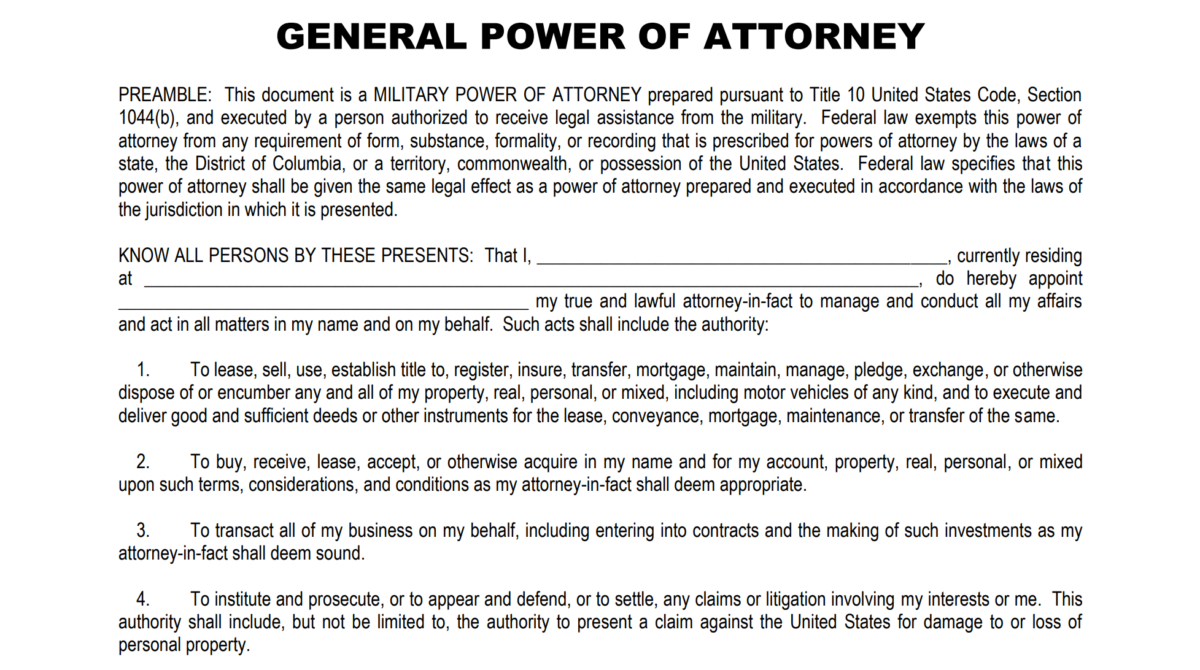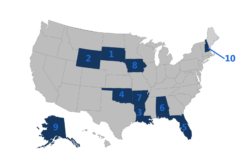Military life often brings unique challenges, especially during deployments or extended periods away from home. One essential tool to help military families navigate these situations is a power of attorney (POA). This legal document allows one person to make decisions or act on behalf of another, ensuring that critical matters can be handled smoothly even when you’re miles apart.
Granting someone you trust a power of attorney can be an immensely helpful tool to use while on deployment. Under the power of attorney, the person acting as your agent can take care of your bank accounts, real estate, contracts, or anything else you choose to give them power over.
What is a Power of Attorney?
A military power of attorney (POA) is a legal document that allows a service member to designate someone (often a spouse, family member, or trusted individual) to act on their behalf. The person receiving power of attorney powers is called the “agent,” and you are called the “principal” or “issuer” of the agreement. It is especially important for military families due to frequent deployments, relocations, and other duties that may prevent service members from managing personal or financial affairs directly.
Here’s an example of a general POA from Marine Corps Base Camp Pendleton.

The military provides legal services offices for all branches that can prepare a power of attorney for service members. A list of these offices is available here.
Types of Power of Attorney for Service Members
General Power of Attorney (GPOA): Grants broad authority to the designated agent, covering most financial and legal matters.
A (GPOA) grants broad authority to handle financial, legal, and personal matters, except those explicitly excluded in the document. This includes managing investments, banking, contracts, property, government benefits, and taxes. In some states, GPOAs can also create or modify trusts. Granting a GPOA doesn’t remove the individual’s right to make decisions while they remain mentally capable. A GPOA is valid until the specified expiration date, the grantor’s incapacitation, or death. Due to the extensive authority it provides, a GPOA should only be entrusted to someone you trust completely.
Special Power of Attorney (SPOA): Limits the agent’s authority to specific tasks, such as selling property, managing accounts, or signing documents.
- A person named a Specific Power of Attorney has authority over a specific situation as described in the document. It may be authority over business operations, debt collections, or the sale of a home, for example. Specific Power of Attorney documents remain in effect until the date indicated in the document, or until the specific transaction is completed, or the issuer of the power passes on.
Durable Power of Attorney: Remains effective even if the grantor becomes incapacitated, allowing the designated agent to manage financial, legal, or healthcare decisions
- When someone is granted Durable Power of Attorney, they are given authority over another person’s financial affairs if he or she is unable to handle them on their own either temporarily or permanently. Most people recommend that Durable Power of Attorney documents be written as “springing” power of attorney – so that you can specify what kind of events will make the power of Attorney document active and give authority to the person named. Doctors are hesitant to label anyone as incapacitated or unable to make their own decisions, even when it is obvious, so having a “springing” power of attorney can remedy the situation by indicating specific events.
Springing Power of Attorney: Becomes effective only when a specific event or condition, such as the grantor’s incapacitation, occurs.
When someone is granted Springing Power of Attorney, it becomes effective when the issuer becomes incapacitated (unable to handle their own affairs) or when the person travels outside the country, etc. The events that transfer the power of attorney are specified in the document.
Choose your Power of Attorney and Agent Wisely
A power of attorney gives someone the legal right to act on your behalf. Because of its broad nature, you should grant a power of attorney only when absolutely necessary and, if possible, limit it to specific events or for a set time frame. Before entering into a power of attorney agreement, it is strongly recommended that you visit a military legal services office or consult an attorney for legal advice.
Remember, the military can provide this through its legal services offices. A list of these offices is available here.
Why Military Families Need a Power of Attorney
Service members often face situations where a POA is indispensable, such as:
- During Deployments: To handle financial obligations, childcare decisions, or home maintenance.
- PCS Moves: For managing real estate transactions or signing lease agreements.
- Unexpected Emergencies: When urgent decisions need to be made in the service member’s absence.
How to Obtain a Military Power of Attorney
The process for obtaining a military POA is straightforward:
- Visit the Legal Assistance Office: Every military installation has a Legal Assistance Office that provides free legal services to service members.
- Fill Out the Appropriate Form: Your legal office can assist you in completing the correct military power of attorney form based on your needs.
- Notarization: Military POAs are notarized free of charge and comply with federal law (10 U.S.C. § 1044b), making them valid across all states.
Military Power of Attorney for Spouses
For military spouses, having a POA can be crucial in managing family responsibilities. With a POA, spouses can:
- Access joint bank accounts.
- Handle insurance claims.
- Enroll children in school or medical programs.
- Manage household or personal financial matters.
Key Considerations When Creating a Military Power of Attorney
- Select a Trusted Agent: Choose someone reliable and capable of handling the responsibilities you assign.
- Understand the Scope: Clearly define the authority you are granting to avoid misunderstandings or misuse.
- Set an Expiration Date: Most military POAs include an expiration date, ensuring the agent’s authority isn’t indefinite.
- Keep Copies Accessible: Provide copies to relevant institutions, like banks or healthcare providers, and keep a copy for yourself.
Frequently Asked Questions
1. Is a military POA different from a regular POA?
Yes, military POAs are governed by federal law and are designed to meet the unique needs of service members and their families. They are accepted across all 50 states and typically notarized at no cost through military legal services.
2. Can a military POA be revoked?
Yes, you can revoke a POA at any time by notifying the agent in writing and destroying all copies of the document. Inform any institutions where the POA has been filed.
3. What happens if I don’t have a POA during deployment?
Without a POA, your family members or trusted individuals may face delays or legal hurdles in handling important matters on your behalf.
*Note: This article is for general informational purposes only and should not be considered legal advice. Please consult with a professional legal representative before choosing which Power of Attorney is right for your situation. Your base legal department is a great place to start.




Comments:
About the comments on this site:
These responses are not provided or commissioned by the bank advertiser. Responses have not been reviewed, approved or otherwise endorsed by the bank advertiser. It is not the bank advertiser’s responsibility to ensure all posts and/or questions are answered.
anon says
So my boyfriend joined LA National Guard in 2008 & at the time he was a minor, but with parental consent/signing etc he was able to join. In 2009 he signed a form of POA called “Procuration appointing her (his mom) as representative, mandatory, and attorney at fact”; at the time he was single around 19 years old and didn’t have any kids etc thus why his mom was chosen. He doesn’t even recall specifics about this signing & what exactly he allowed her to control. We are in 2019 and his mother holds that POA over his head for everything even goes as far as trying to control things with his son & she continuously brags/tells everyone she has POA. We’ve tried to talk to her about it but honestly there is no way she would give us information or even the document so we can try to get this terminated. What should we do to get this dealt with. He’s not incompetent, we take care of bills, his son, etc. We are currently getting other legal things handled and we did not want to have to fight with his mom about this, but it seems like that’s what is going to happen. I’ve been doing research with the information I have, but we don’t have much. The lady who drew up this document is no longer doing this and apparently according to coworker’s her work was ‘sketchy’ to begin with. I hope its expired, that would be the best option but I have a feeling she had it drawn up to where it doesn’t have expiration. I read about revoking POA, but just looking for some advice.
Ryan Guina says
Hello Anon, your boyfriend should speak with the JAG at his base legal office. They can advise him about his options. The JAG offers free legal assistance to military members. Best wishes to you both.
Allen G Schaefer says
I have an acquaintance who disparately needs a financial POA. She and I don’t know each other well enough that I feel comfortable stepping up as her POA. She is deployed and her mom normally handles her financial affairs while she is deployed. Unfortunately, her mom is now critically ill and unable to help. Does the military have some sort of support program to secure a POA for single military persons who have no family etc to stand in a POA’s
Ryan Guina says
Hello Allen,
Thank you for your comment. The military has several plans in place.
The military requires single parent military members and dual military couples to have a Family Care Plan in the event they deploy. The Family Care Plan ensures the military member has a trusted family member or friend who can help assist with child care and other financial matters. It is generally recommended that the individual also obtain a Power of Attorney in these situations.
The military does not require members to have a Power of Attorney or Family Care Plan if they do not have children.
The military also requires members to go through pre-deployment briefings covering all of this information.
Most financial matters can be taken care of even while deployed. However, there may be some items that would be difficult to handle while deployed. It is in these latter situations that a POA is advisable.
So yes, the military does have plans in place. However, it is up to the individual to initiate these plans. And it sounds like the servicemember had her mom in place. But it is unfortunate that she is ill and can not currently assist.
I’m not sure the best plan of action for the member. It sounds like she should speak with her legal office or supervision to try and find a solution.
And I would not take on that kind of responsibility if you do not know the person well enough or do not feel comfortable acting in her place for financial matters. It could be a very stressful situation and open the door to potential problems down the road. If you are considering it, it might not be a bad idea to speak with a legal specialist first to ensure you understand the full implications.
I wish everyone involved the best in this situation.
Alexcia Rullan says
I need some help. I just found out today that I was part a lawsuit as a minor before I joined the service. And it was settled while I was in service. At the time I turned 18, I immediately left for the Army after high school and never knew the process was still in development. My mother told me a few months after I had joined the Army that I was excluded from the lawsuit because I was waived “accepted” into the service during my physical examination at MEPS inprocessing. Today I learned that 10 years ago in 2004, my mother took a power of attorney out on me. I did get a 1 page copy from the attorney who represented the case 10 years ago, but it has my name my mother’s name and no signature and is incomplete. The lawyer today advised me that in 2004 it was settled and she was cut payment on my behalf due to the acting power of attorney signed after I turned 18, I never saw this money or even knew it existed. My mother did pressure me a long time for me to grant her power of attorney over my affairs and I refused and 10 years later I find out she had obtained one illegally. I CAN PROVE FRAUD as my printed name signature does not match and it’s one page long on this document there is no signature nor is there any specifications . I am a disabled veteran currently and I am not sure where to start with this. Please help. I know I need a lawyer but what kind of law would I start with?
Ryan Guina says
Alexcia, It sounds like need to find a lawyer who practices law in the state where the fraud was committed. He or she will be able to advise you on your rights and whether or not it makes sense to pursue any form of legal action. Keep in mind that the statue of limitations is different in each state, so you may be running low on time to pursue legal action.
I would also advise you to speak to your mother. I don’t know how your relationship is at this time, but this is something to consider before you decide to pursue any legal action. Pursuing legal action against a family member is a tricky thing and should be avoided whenever possible.